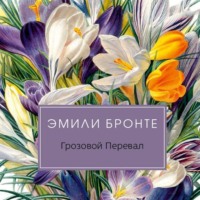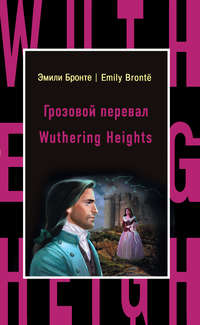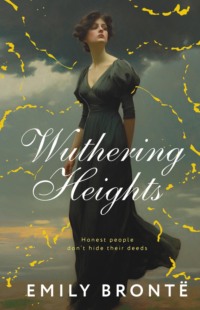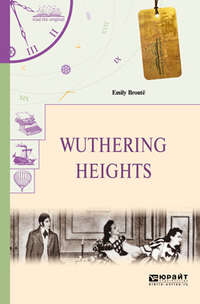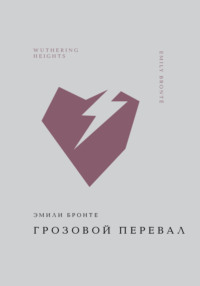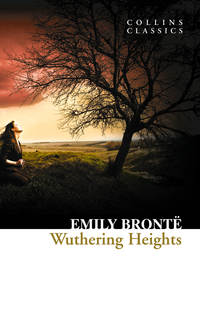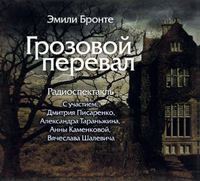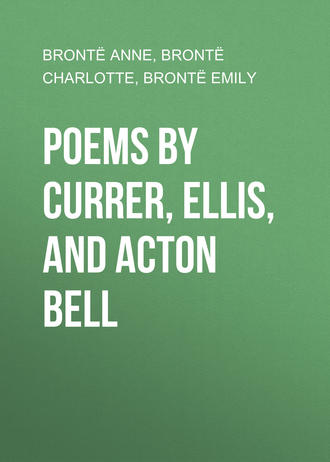 полная версия
полная версияPoems by Currer, Ellis, and Acton Bell
Here again is the same mind in converse with a like abstraction. "The Night-Wind," breathing through an open window, has visited an ear which discerned language in its whispers.
THE NIGHT-WIND
In summer's mellow midnight, A cloudless moon shone through Our open parlour window, And rose-trees wet with dew. I sat in silent musing; The soft wind waved my hair; It told me heaven was glorious, And sleeping earth was fair. I needed not its breathing To bring such thoughts to me; But still it whispered lowly, How dark the woods will be! "The thick leaves in my murmur Are rustling like a dream, And all their myriad voices Instinct with spirit seem." I said, "Go, gentle singer, Thy wooing voice is kind: But do not think its music Has power to reach my mind. "Play with the scented flower, The young tree's supple bough, And leave my human feelings In their own course to flow." The wanderer would not heed me; Its kiss grew warmer still. "O come!" it sighed so sweetly; "I'll win thee 'gainst thy will. "Were we not friends from childhood? Have I not loved thee long? As long as thou, the solemn night, Whose silence wakes my song. "And when thy heart is resting Beneath the church-aisle stone, I shall have time for mourning, And THOU for being alone."In these stanzas a louder gale has roused the sleeper on her pillow: the wakened soul struggles to blend with the storm by which it is swayed: —
Ay – there it is! it wakes to-night Deep feelings I thought dead; Strong in the blast – quick gathering light — The heart's flame kindles red. "Now I can tell by thine altered cheek, And by thine eyes' full gaze, And by the words thou scarce dost speak, How wildly fancy plays. "Yes – I could swear that glorious wind Has swept the world aside, Has dashed its memory from thy mind Like foam-bells from the tide: "And thou art now a spirit pouring Thy presence into all: The thunder of the tempest's roaring, The whisper of its fall: "An universal influence, From thine own influence free; A principle of life – intense — Lost to mortality. "Thus truly, when that breast is cold, Thy prisoned soul shall rise; The dungeon mingle with the mould — The captive with the skies. Nature's deep being, thine shall hold, Her spirit all thy spirit fold, Her breath absorb thy sighs. Mortal! though soon life's tale is told; Who once lives, never dies!"LOVE AND FRIENDSHIP
Love is like the wild rose-briar; Friendship like the holly-tree. The holly is dark when the rose-briar blooms, But which will bloom most constantly? The wild rose-briar is sweet in spring, Its summer blossoms scent the air; Yet wait till winter comes again, And who will call the wild-briar fair? Then, scorn the silly rose-wreath now, And deck thee with the holly's sheen, That, when December blights thy brow, He still may leave thy garland green.THE ELDER'S REBUKE
"Listen! When your hair, like mine, Takes a tint of silver gray; When your eyes, with dimmer shine, Watch life's bubbles float away: When you, young man, have borne like me The weary weight of sixty-three, Then shall penance sore be paid For those hours so wildly squandered; And the words that now fall dead On your ear, be deeply pondered — Pondered and approved at last: But their virtue will be past! "Glorious is the prize of Duty, Though she be 'a serious power'; Treacherous all the lures of Beauty, Thorny bud and poisonous flower! "Mirth is but a mad beguiling Of the golden-gifted time; Love – a demon-meteor, wiling Heedless feet to gulfs of crime. "Those who follow earthly pleasure, Heavenly knowledge will not lead; Wisdom hides from them her treasure, Virtue bids them evil-speed! "Vainly may their hearts repenting. Seek for aid in future years; Wisdom, scorned, knows no relenting; Virtue is not won by fears." Thus spake the ice-blooded elder gray; The young man scoffed as he turned away, Turned to the call of a sweet lute's measure, Waked by the lightsome touch of pleasure: Had he ne'er met a gentler teacher, Woe had been wrought by that pitiless preacher.THE WANDERER FROM THE FOLD
How few, of all the hearts that loved, Are grieving for thee now; And why should mine to-night be moved With such a sense of woe? Too often thus, when left alone, Where none my thoughts can see, Comes back a word, a passing tone From thy strange history. Sometimes I seem to see thee rise, A glorious child again; All virtues beaming from thine eyes That ever honoured men: Courage and truth, a generous breast Where sinless sunshine lay: A being whose very presence blest Like gladsome summer-day. O, fairly spread thy early sail, And fresh, and pure, and free, Was the first impulse of the gale Which urged life's wave for thee! Why did the pilot, too confiding, Dream o'er that ocean's foam, And trust in Pleasure's careless guiding To bring his vessel home? For well he knew what dangers frowned, What mists would gather, dim; What rocks and shelves, and sands lay round Between his port and him. The very brightness of the sun The splendour of the main, The wind which bore him wildly on Should not have warned in vain. An anxious gazer from the shore — I marked the whitening wave, And wept above thy fate the more Because – I could not save. It recks not now, when all is over: But yet my heart will be A mourner still, though friend and lover Have both forgotten thee!WARNING AND REPLY
In the earth – the earth – thou shalt be laid, A grey stone standing over thee; Black mould beneath thee spread, And black mould to cover thee. "Well – there is rest there, So fast come thy prophecy; The time when my sunny hair Shall with grass roots entwined be." But cold – cold is that resting-place, Shut out from joy and liberty, And all who loved thy living face Will shrink from it shudderingly, "Not so. HERE the world is chill, And sworn friends fall from me: But THERE – they will own me still, And prize my memory." Farewell, then, all that love, All that deep sympathy: Sleep on: Heaven laughs above, Earth never misses thee. Turf-sod and tombstone drear Part human company; One heart breaks only – here, But that heart was worthy thee!LAST WORDS
I knew not 'twas so dire a crime To say the word, "Adieu;" But this shall be the only time My lips or heart shall sue. That wild hill-side, the winter morn, The gnarled and ancient tree, If in your breast they waken scorn, Shall wake the same in me. I can forget black eyes and brows, And lips of falsest charm, If you forget the sacred vows Those faithless lips could form. If hard commands can tame your love, Or strongest walls can hold, I would not wish to grieve above A thing so false and cold. And there are bosoms bound to mine With links both tried and strong: And there are eyes whose lightning shine Has warmed and blest me long: Those eyes shall make my only day, Shall set my spirit free, And chase the foolish thoughts away That mourn your memory.THE LADY TO HER GUITAR
For him who struck thy foreign string, I ween this heart has ceased to care; Then why dost thou such feelings bring To my sad spirit – old Guitar? It is as if the warm sunlight In some deep glen should lingering stay, When clouds of storm, or shades of night, Have wrapt the parent orb away. It is as if the glassy brook Should image still its willows fair, Though years ago the woodman's stroke Laid low in dust their Dryad-hair. Even so, Guitar, thy magic tone Hath moved the tear and waked the sigh: Hath bid the ancient torrent moan, Although its very source is dry.THE TWO CHILDREN
Heavy hangs the rain-drop From the burdened spray; Heavy broods the damp mist On uplands far away. Heavy looms the dull sky, Heavy rolls the sea; And heavy throbs the young heart Beneath that lonely tree. Never has a blue streak Cleft the clouds since morn; Never has his grim fate Smiled since he was born. Frowning on the infant, Shadowing childhood's joy Guardian-angel knows not That melancholy boy. Day is passing swiftly Its sad and sombre prime; Boyhood sad is merging In sadder manhood's time: All the flowers are praying For sun, before they close, And he prays too – unconscious — That sunless human rose. Blossom – that the west-wind Has never wooed to blow, Scentless are thy petals, Thy dew is cold as snow! Soul – where kindred kindness, No early promise woke, Barren is thy beauty, As weed upon a rock. Wither – soul and blossom! You both were vainly given; Earth reserves no blessing For the unblest of heaven! Child of delight, with sun-bright hair, And sea-blue, sea-deep eyes! Spirit of bliss! What brings thee here Beneath these sullen skies? Thou shouldst live in eternal spring, Where endless day is never dim; Why, Seraph, has thine erring wing Wafted thee down to weep with him? "Ah! not from heaven am I descended, Nor do I come to mingle tears; But sweet is day, though with shadows blended; And, though clouded, sweet are youthful years. "I – the image of light and gladness — Saw and pitied that mournful boy, And I vowed – if need were – to share his sadness, And give to him my sunny joy. "Heavy and dark the night is closing; Heavy and dark may its biding be: Better for all from grief reposing, And better for all who watch like me — "Watch in love by a fevered pillow, Cooling the fever with pity's balm Safe as the petrel on tossing billow, Safe in mine own soul's golden calm! "Guardian-angel he lacks no longer; Evil fortune he need not fear: Fate is strong, but love is stronger; And MY love is truer than angel-care."THE VISIONARY
Silent is the house: all are laid asleep: One alone looks out o'er the snow-wreaths deep, Watching every cloud, dreading every breeze That whirls the wildering drift, and bends the groaning trees. Cheerful is the hearth, soft the matted floor; Not one shivering gust creeps through pane or door; The little lamp burns straight, its rays shoot strong and far: I trim it well, to be the wanderer's guiding-star. Frown, my haughty sire! chide, my angry dame! Set your slaves to spy; threaten me with shame: But neither sire nor dame, nor prying serf shall know, What angel nightly tracks that waste of frozen snow. What I love shall come like visitant of air, Safe in secret power from lurking human snare; What loves me, no word of mine shall e'er betray, Though for faith unstained my life must forfeit pay Burn, then, little lamp; glimmer straight and clear — Hush! a rustling wing stirs, methinks, the air: He for whom I wait, thus ever comes to me; Strange Power! I trust thy might; trust thou my constancy.ENCOURAGEMENT
I do not weep; I would not weep; Our mother needs no tears: Dry thine eyes, too; 'tis vain to keep This causeless grief for years. What though her brow be changed and cold, Her sweet eyes closed for ever? What though the stone – the darksome mould Our mortal bodies sever? What though her hand smooth ne'er again Those silken locks of thine? Nor, through long hours of future pain, Her kind face o'er thee shine? Remember still, she is not dead; She sees us, sister, now; Laid, where her angel spirit fled, 'Mid heath and frozen snow. And from that world of heavenly light Will she not always bend To guide us in our lifetime's night, And guard us to the end? Thou knowest she will; and thou mayst mourn That WE are left below: But not that she can ne'er return To share our earthly woe.STANZAS
Often rebuked, yet always back returning To those first feelings that were born with me, And leaving busy chase of wealth and learning For idle dreams of things which cannot be: To-day, I will seek not the shadowy region; Its unsustaining vastness waxes drear; And visions rising, legion after legion, Bring the unreal world too strangely near. I'll walk, but not in old heroic traces, And not in paths of high morality, And not among the half-distinguished faces, The clouded forms of long-past history. I'll walk where my own nature would be leading: It vexes me to choose another guide: Where the grey flocks in ferny glens are feeding; Where the wild wind blows on the mountain side. What have those lonely mountains worth revealing? More glory and more grief than I can tell: The earth that wakes one human heart to feeling Can centre both the worlds of Heaven and Hell.The following are the last lines my sister Emily ever wrote: —
No coward soul is mine, No trembler in the world's storm-troubled sphere: I see Heaven's glories shine, And faith shines equal, arming me from fear. O God within my breast, Almighty, ever-present Deity! Life – that in me has rest, As I – undying Life – have power in thee! Vain are the thousand creeds That move men's hearts: unutterably vain; Worthless as withered weeds, Or idlest froth amid the boundless main, To waken doubt in one Holding so fast by thine infinity; So surely anchored on The stedfast rock of immortality. With wide-embracing love Thy spirit animates eternal years, Pervades and broods above, Changes, sustains, dissolves, creates, and rears. Though earth and man were gone, And suns and universes ceased to be, And Thou were left alone, Every existence would exist in Thee. There is not room for Death, Nor atom that his might could render void: Thou – THOU art Being and Breath, And what THOU art may never be destroyed.SELECTIONS FROM POEMS BY ACTON BELL
In looking over my sister Anne's papers, I find mournful evidence that religious feeling had been to her but too much like what it was to Cowper; I mean, of course, in a far milder form. Without rendering her a prey to those horrors that defy concealment, it subdued her mood and bearing to a perpetual pensiveness; the pillar of a cloud glided constantly before her eyes; she ever waited at the foot of a secret Sinai, listening in her heart to the voice of a trumpet sounding long and waxing louder. Some, perhaps, would rejoice over these tokens of sincere though sorrowing piety in a deceased relative: I own, to me they seem sad, as if her whole innocent life had been passed under the martyrdom of an unconfessed physical pain: their effect, indeed, would be too distressing, were it not combated by the certain knowledge that in her last moments this tyranny of a too tender conscience was overcome; this pomp of terrors broke up, and passing away, left her dying hour unclouded. Her belief in God did not then bring to her dread, as of a stern Judge, – but hope, as in a Creator and Saviour: and no faltering hope was it, but a sure and stedfast conviction, on which, in the rude passage from Time to Eternity, she threw the weight of her human weakness, and by which she was enabled to bear what was to be borne, patiently – serenely – victoriously.
DESPONDENCY
I have gone backward in the work; The labour has not sped; Drowsy and dark my spirit lies, Heavy and dull as lead. How can I rouse my sinking soul From such a lethargy? How can I break these iron chains And set my spirit free? There have been times when I have mourned! In anguish o'er the past, And raised my suppliant hands on high, While tears fell thick and fast; And prayed to have my sins forgiven, With such a fervent zeal, An earnest grief, a strong desire As now I cannot feel. And I have felt so full of love, So strong in spirit then, As if my heart would never cool, Or wander back again. And yet, alas! how many times My feet have gone astray! How oft have I forgot my God! How greatly fallen away! My sins increase – my love grows cold, And Hope within me dies: Even Faith itself is wavering now; Oh, how shall I arise? I cannot weep, but I can pray, Then let me not despair: Lord Jesus, save me, lest I die! Christ, hear my humble prayer!A PRAYER
My God (oh, let me call Thee mine, Weak, wretched sinner though I be), My trembling soul would fain be Thine; My feeble faith still clings to Thee. Not only for the Past I grieve, The Future fills me with dismay; Unless Thou hasten to relieve, Thy suppliant is a castaway. I cannot say my faith is strong, I dare not hope my love is great; But strength and love to Thee belong; Oh, do not leave me desolate! I know I owe my all to Thee; Oh, TAKE the heart I cannot give! Do Thou my strength – my Saviour be, And MAKE me to Thy glory live.IN MEMORY OF A HAPPY DAY IN FEBRUARY
Blessed be Thou for all the joy My soul has felt to-day! Oh, let its memory stay with me, And never pass away! I was alone, for those I loved Were far away from me; The sun shone on the withered grass, The wind blew fresh and free. Was it the smile of early spring That made my bosom glow? 'Twas sweet; but neither sun nor wind Could cheer my spirit so. Was it some feeling of delight All vague and undefined? No; 'twas a rapture deep and strong, Expanding in the mind. Was it a sanguine view of life, And all its transient bliss, A hope of bright prosperity? Oh, no! it was not this. It was a glimpse of truth divine Unto my spirit given, Illumined by a ray of light That shone direct from heaven. I felt there was a God on high, By whom all things were made; I saw His wisdom and His power In all his works displayed. But most throughout the moral world, I saw his glory shine; I saw His wisdom infinite, His mercy all divine. Deep secrets of His providence, In darkness long concealed, Unto the vision of my soul Were graciously revealed. But while I wondered and adored His Majesty divine, I did not tremble at His power: I felt that God was mine; I knew that my Redeemer lived; I did not fear to die; Full sure that I should rise again To immortality. I longed to view that bliss divine, Which eye hath never seen; Like Moses, I would see His face Without the veil between.CONFIDENCE
Oppressed with sin and woe, A burdened heart I bear, Opposed by many a mighty foe; But I will not despair. With this polluted heart, I dare to come to Thee, Holy and mighty as Thou art, For Thou wilt pardon me. I feel that I am weak, And prone to every sin; But Thou who giv'st to those who seek, Wilt give me strength within. Far as this earth may be From yonder starry skies; Remoter still am I from Thee: Yet Thou wilt not despise. I need not fear my foes, I deed not yield to care; I need not sink beneath my woes, For Thou wilt answer prayer. In my Redeemer's name, I give myself to Thee; And, all unworthy as I am, My God will cherish me.My sister Anne had to taste the cup of life as it is mixed for the class termed "Governesses."
The following are some of the thoughts that now and then solace a governess: —
LINES WRITTEN FROM HOME
Though bleak these woods, and damp the ground, With fallen leaves so thickly strewn, And cold the wind that wanders round With wild and melancholy moan; There is a friendly roof I know, Might shield me from the wintry blast; There is a fire whose ruddy glow Will cheer me for my wanderings past. And so, though still where'er I go Cold stranger glances meet my eye; Though, when my spirit sinks in woe, Unheeded swells the unbidden sigh; Though solitude, endured too long, Bids youthful joys too soon decay, Makes mirth a stranger to my tongue, And overclouds my noon of day; When kindly thoughts that would have way Flow back, discouraged, to my breast, I know there is, though far away, A home where heart and soul may rest. Warm hands are there, that, clasped in mine, The warmer heart will not belie; While mirth and truth, and friendship shine In smiling lip and earnest eye. The ice that gathers round my heart May there be thawed; and sweetly, then, The joys of youth, that now depart, Will come to cheer my soul again. Though far I roam, that thought shall be My hope, my comfort everywhere; While such a home remains to me, My heart shall never know despair.THE NARROW WAY
Believe not those who say The upward path is smooth, Lest thou shouldst stumble in the way, And faint before the truth. It is the only road Unto the realms of joy; But he who seeks that blest abode Must all his powers employ. Bright hopes and pure delight Upon his course may beam, And there, amid the sternest heights, The sweetest flowerets gleam. On all her breezes borne, Earth yields no scents like those; But he that dares not gasp the thorn Should never crave the rose. Arm – arm thee for the fight! Cast useless loads away; Watch through the darkest hours of night; Toil through the hottest day. Crush pride into the dust, Or thou must needs be slack; And trample down rebellious lust, Or it will hold thee back. Seek not thy honour here; Waive pleasure and renown; The world's dread scoff undaunted bear, And face its deadliest frown. To labour and to love, To pardon and endure, To lift thy heart to God above, And keep thy conscience pure; Be this thy constant aim, Thy hope, thy chief delight; What matter who should whisper blame Or who should scorn or slight? What matter, if thy God approve, And if, within thy breast, Thou feel the comfort of His love, The earnest of His rest?DOMESTIC PEACE
Why should such gloomy silence reign, And why is all the house so drear, When neither danger, sickness, pain, Nor death, nor want, have entered here? We are as many as we were That other night, when all were gay And full of hope, and free from care; Yet is there something gone away. The moon without, as pure and calm, Is shining as that night she shone; But now, to us, she brings no balm, For something from our hearts is gone. Something whose absence leaves a void — A cheerless want in every heart; Each feels the bliss of all destroyed, And mourns the change – but each apart. The fire is burning in the grate As redly as it used to burn; But still the hearth is desolate, Till mirth, and love, and PEACE return. 'Twas PEACE that flowed from heart to heart, With looks and smiles that spoke of heaven, And gave us language to impart The blissful thoughts itself had given. Domestic peace! best joy of earth, When shall we all thy value learn? White angel, to our sorrowing hearth, Return – oh, graciously return!

